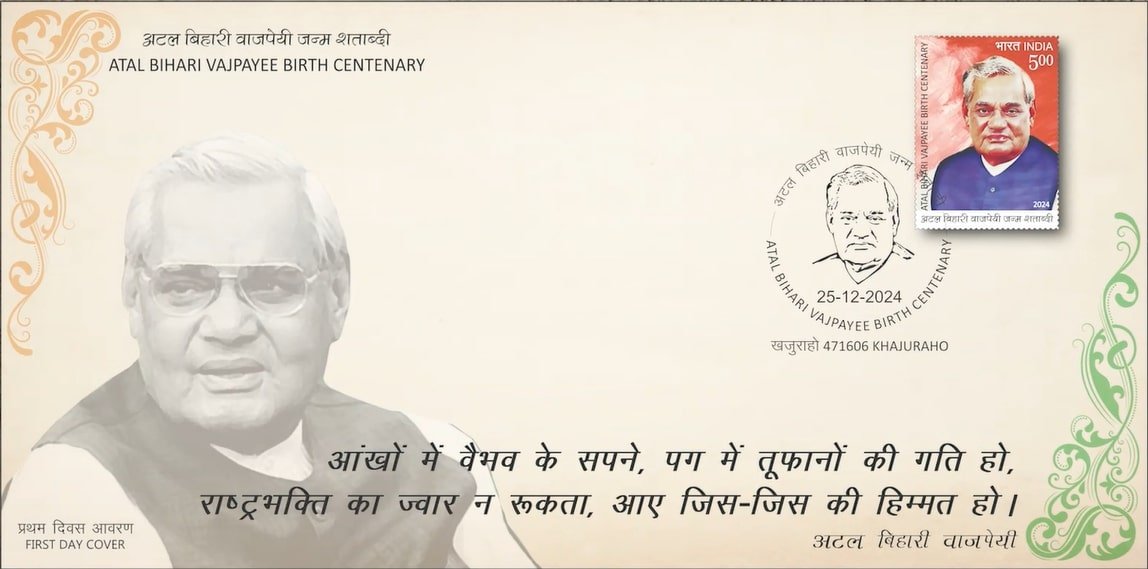Atal Bihari Vajpayee Birth Centenary

Technical Data
| Date of Issue | December 25, 2024 |
|---|---|
| Denomination | Rs. 5 |
| Quantity | 202,800 |
| Perforation | 14½ |
| Printer | Security Printing Press, Hyderabad |
| Printing Process | Wet Offset |
| Watermark | No Watermark |
| Colors | Multicolor |
| Credit (Designed By) | Ms. Nenu Gupta |
| Catalog Codes |
Stanley Gibbons IN 3930 Colnect codes IN 2024.12.25-01 |
| Themes | Anniversaries and Jubilees | Famous people | Men | Politicians | Prime Ministers |
Atal Bihari Vajpayee Stamp – Honoring a Statesman and Visionary Leader
The Atal Bihari Vajpayee Stamp celebrates one of India’s most beloved leaders, a statesman whose eloquence, vision, and dedication to democracy shaped the destiny of modern India. Issued to commemorate his extraordinary life, the stamp is a tribute to a leader remembered for his compassion, courage, and nation-first spirit.
Early Life and Education
Born on December 25, 1924, in Gwalior, Madhya Pradesh, Atal Bihari Vajpayee grew up in a humble family where values of discipline and integrity were deeply ingrained by his father, a school teacher. An outstanding student, he earned a B.A. in Arts from Victoria College (now Laxmibai College) and an M.A. in Political Science from DAV College, Kanpur. His early education laid the foundation for his lifelong interest in governance, diplomacy, and public policy.
The Beginning of a Political Journey
Vajpayee Ji’s political career began during his student days, when he joined the Quit India Movement of 1942, a turning point in India’s freedom struggle. Initially inclined toward journalism, his passion for public service soon led him to politics. In 1951, he became a founding member of the Bharatiya Jana Sangh, which later evolved into the Bharatiya Janata Party (BJP). His sharp intellect, powerful oratory, and poetic flair quickly earned him recognition as one of India’s most admired political voices.
Parliamentary Career and Leadership
Over more than four decades in public life, Vajpayee Ji was elected nine times to the Lok Sabha and twice to the Rajya Sabha. He held distinguished roles as Prime Minister, Foreign Minister, Leader of the Opposition, and Chairperson of key parliamentary committees. In each role, he left a profound imprint on India’s domestic and foreign policies.
Prime Ministership and Transformative Vision
Shri Atal Bihari Vajpayee served as Prime Minister of India three times, including a full term from 1999 to 2004. His leadership was marked by bold reforms, forward-looking policies, and a vision of a modern, strong, and interconnected India.
One of his most enduring contributions was the Golden Quadrilateral project, which connected Delhi, Mumbai, Chennai, and Kolkata through a world-class highway network. This ambitious infrastructure initiative transformed connectivity, trade, and economic growth across India, symbolizing his belief in a nation ready for the 21st century.
Vajpayee Ji was equally admired for his consensus-building leadership, often reaching across party lines to strengthen democracy and governance. His tenure reflected a balance of pragmatism and idealism, earning him respect from both allies and political adversaries.
A Lasting Legacy
Beyond politics, Atal Bihari Vajpayee was a poet, thinker, and humanitarian. His speeches and writings carried depth, wit, and compassion, offering both inspiration and guidance. Honored with the Padma Vibhushan (1992), the Bharat Ratna (2015), and the title of Best Parliamentarian (1994), he remains an enduring symbol of statesmanship and democratic ideals.
Philatelic Significance
The commemorative stamp of Atal Bihari Vajpayee immortalizes a leader whose life story continues to inspire generations. For philatelists, this stamp is more than a collectible—it is a timeless reminder of a man who combined vision with humility, politics with poetry, and leadership with humanity.
First Day Cover


Leave a Comment
You must be logged in to post a comment.